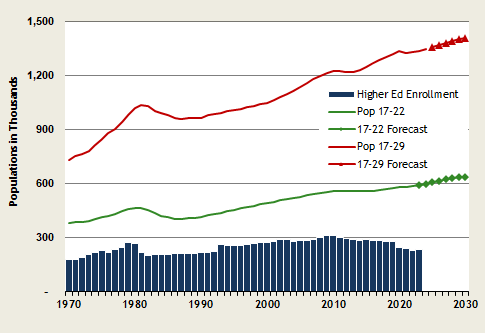Public higher education enrollment
Public Higher Education Enrollment
| Year | Fall Headcount Enrollment |
|---|---|
| 2023 | 235,023 |
| 2022 | 231,470 |
| 2021 | 239,930 |
| 2020 | 246,850 |
| 2019 | 279,458 |
| 2018 | 282,594 |
| 2017 | 283,648 |
| 2016 | 284,476 |
| 2015 | 288,215 |
| 2014 | 285,955 |
| 2013 | 288,593 |
| 2012 | 293,720 |
| 2011 | 301,696 |
| 2010 | 313,334 |
| 2009 | 311,743 |
| 2008 | 303,487 |
| 2007 | 291,907 |
| 2006 | 286,230 |
| 2005 | 283,160 |
| 2004 | 279,911 |
| 2003 | 288,057 |
Compared to Prime College-Age Population

- Demographic pressures on higher education have been strong since the children of Baby Boomers reached college age.
- A flattening of prime college-age populations encompassed much of the 2010 - 2020 period, even as the older student population continued to rise.
- While most institutions have experienced declining enrollment, with the University of Washington being the exception, the bulk of that decline has been in the community and technical colleges.
- Fall 2023 enrollment in public higher education enrollment grew by 2% compared to fall 2022. This increase was driven by enrollment in community and technical colleges that grew by 5% year-over-year. Fall 2023 enrollment in 4-year institutions continued to decline but at a slower pace, -1% year-over year vs -4% year-over-year in fall 2022.
Data source:
E-mail: OFM.Forecasting@ofm.wa.gov
Last updated
Thursday, December 12, 2024


